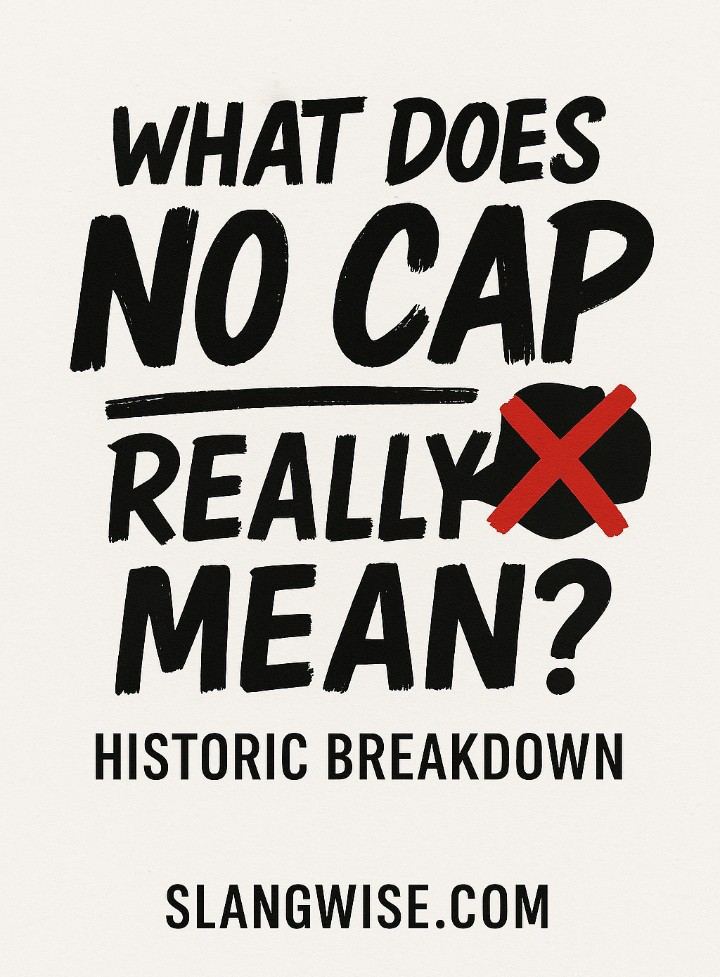Last updated: December 21, 2025
~ Slangwise ~
“No cap is more than just slang; it’s a badge of authenticity in online culture.”
“When someone says ‘no cap,’ they’re keeping it 100, no exaggeration, no compromise, no lies. Just the truth”
“Wait, So It’s Not About Hats?” Yeah, it’s not. lol

Scrolling through feeds you will meet two tiny words that carry a lot of weight: cap and no cap. These tags tell readers immediately whether a claim is a stretch or sincere.
In the space of a few characters they sort truth from theatrics, and they do so with roots in Black language and hip hop culture.
“No cap” has popped up everywhere, from social media posts to everyday conversation, and it might seem a bit mysterious at first. But don’t worry; I will explain what it means.
Imagine you’re hanging out with friends and someone exclaims, “That’s the best idea ever, no cap!” You might smile, nod, or even ask, “Wait, what does that mean?” Well, you’re not alone.
In this blog post, I shed light on how no cap went from being a simple expression to a cultural phenomenon. You’d get to know its origins, how it’s evolved over time, and why so many people today swear by it to keep things honest.
So, grab a seat and get ready for a fun and interactive journey into the real story behind no cap. And I also invite you to share your own experiences with this slang phrase in the comments too.
Let’s unpack the hype together, one cap at a time!
Table of Contents
In a Nutshell
- Cap meaning: Cap means a lie or exaggeration and is used to call out something you think is not true.
- No cap meaning: No cap means no lie or for real and is used to emphasize honesty or seriousness.
- The phrases come from African American English and gained mainstream reach through Southern hip hop and social media.
- Use them in casual contexts to signal credibility or to call out false claims but avoid them in formal settings.
Slangwise Thought on Cap and No Cap
I treat no cap as a cultural fingerprint for a moment in online language. It reveals who you are talking with and what tone you expect. Use it sparingly and it will sharpen your message.
Linguistically cap and no cap illustrate how short pragmatic markers can carry discourse level meaning. They perform the job of stance markers or evidential language that elsewhere requires full phrases.
Because they come from AAVE their travel into mass culture is a case study in linguistic diffusion and the ethical questions that follow when origin communities are not credited. Business Insider
What cap and no cap mean

Cap is short for lie exaggeration or falsehood. If someone says that is cap they are saying the claim is not true.
No cap means no lie or for real. It is a truth emphasis that promises sincerity.
Examples:
- He said he met Beyonce last night cap
- I finished the whole project in two hours no cap
These two words work as quick credibility tags. They can be a blunt accusation or a friendly reassurance depending on tone.
No Cap Energy – Periodt: Say it with drip

You already say it every day.
Now let your outfit do the talking.
Shop the Cap / No Cap merch: no cap.
Where cap and no cap come from
The pair traces to African American English and to hip hop culture especially in the South. Capping capping as a verb meaning to lie or boast existed in Black speech before mainstream adoption.
By the 2010s Atlanta artists and other Southern rappers used cap and no cap in tracks and interviews. Social media then amplified the words from regional scenes into global usage.
Why that history matters When slang moves from a linguistic community into the mainstream it often loses provenance. Recognizing the origin is not only accurate it is respectful.
These words did not appear out of nowhere they evolved from decades of Black expressive culture.
How the terms spread
Music placed cap and no cap into public ears. Platforms like Twitter Instagram and eventually TikTok turned short phrases into meme friendly slogans.
Memes challenges and celebrity use produced viral loops that pushed the terms into everyday chat and also brand copy.
Natural ways to use cap and no cap
Here are format examples across platforms and in voice so you can see tone and register.
Text and group chat: That party had free food cap. I actually ran five miles today no cap
Social media captions: Just got front row tickets no cap. This new burger is better than fries cap
Verbal use: Friend to friend when calling out a flex You paid how much for that jacket cap. In conversation for emphasis Bro I loved that movie no cap
Mid sentence usage: She aced the exam no cap she deserves the scholarship. You spent three hundred on sneakers cap right
Emoji pairings: cap emoji suggestion: 🧢No cap emoji suggestion: 🛑🧢 or simply 🧢 with a check or sparkle
Cap and No Cap Tone and register guide
Use cap and no cap in casual peer to peer chat and social posts. They do not belong in professional emails legal documents or formal presentations.
If you want to show cultural fluency use them where informal credibility matters like friend groups social feeds and streaming chat.
Common mistakes and how to avoid them
Overuse: If you say no cap in every sentence it loses force. Reserve it for claims you want to give extra weight.
Mismatched audience: Do not use cap to accuse strangers in professional contexts. In work messages choose clear language.
Ambiguity: Cap works best when it is clear what statement you are calling out. If the target of cap is vague people will be confused.
Tonal mismatch: Using cap aggressively can escalate. If your goal is playful push for smiley faces or softer phrasing to avoid misunderstanding.
Variants and related slang
- All cap: used to label something as totally false
- Capping cappin capper: forms that describe someone who lies or brags
- No lie and deadass: other ways to emphasize honesty in some dialects
Pop culture moments and timeline
- Early 2010s Southern hip hop usage solidifies the term inside music culture
- 2017 to 2020 social media acceleration moves no cap into mainstream meme circuits
- By 2020 public figures and athletes were using the phrase in interviews increasing media visibility
Why cap and no cap matter beyond slang
They do three things in short form
- Signal cultural belonging when used appropriately
- Provide a quick credibility shorthand in fast moving feeds
- Reveal how language from Black communities shapes wide cultural norms
Understanding that history helps avoid appropriation and encourages attribution when possible.
When to use no cap for maximal effect
- When you want to underline a surprising truth I actually baked the whole cake myself no cap.
- In a caption where brevity matters and you want to sell credibility.
- When inviting trust in a casual ask like loaning a friend money
Practical examples you can start using today
For Instagram:
- Caption for a win: Landed the promotion today no cap.
- Caption for a joke: Bought seven hoodies on sale cap
For Twitter:
- Hot take with emphasis: That new album slaps no cap
- Call out false rumor: They said she moved to Paris cap
For TikTok:
- Voiceover truth tag: I paid full price for those shoes no cap
- Call out trend: That hack works cap
Responsible use and cultural respect
Using words that originate in AAVE comes with responsibility. Credit creators when appropriate avoid mocking origins and be mindful of context.
Slang can be borrowed respectfully but not at the expense of the speech community that created it.
Final thought
I encourage you to use cap and no cap as tools not as filler. They are concise and punchy because they do real work in conversation.
Keep context and origin in view and your use will register as savvy rather than forced. I will also add that language evolves fast so stay curious and observant about how the phrase shifts over time.
FAQs
Cap means lie exaggeration or falsehood often used to call out a statement as untrue.
No cap is common in text and spoken conversation. It works across platforms but fits casual settings.
Use the term sparingly in contexts where it fits listen to speakers from the origin community and avoid parodying pronunciation or using it to mock.
Yes sometimes people use cap playfully to tease like That party was cap meaning it was surprisingly good or bad depending on tone.
